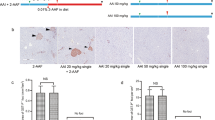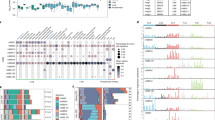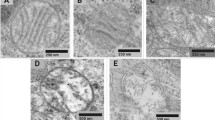Abstract
Diethylnitrosamine (DENA) at 10 mg/kg was fed to adult rats either continuously or for periods ranging from 1 to 10 weeks. Survival correlated inversely with the duration of carcinogen feeding. Less than 4 weeks of DENA feeding produced only preneoplastic foci that persisted indefinitely, 4 weeks were found to be necessary for the transformation of preneoplastic lesions into liver cancers, after 6 weeks, the incidence of hepatomas was 100%. The process of liver cancerization appeared to be identical whether DENA was fed for 8 weeks or continuously up to the time of death. These results are discussed in the light of the evolution of the homoeostatic control of liver-cell division during DENA feeding, in order to distinguish the different successive roles played by the carcinogen.
This is a preview of subscription content, access via your institution
Access options
Subscribe to this journal
Receive 24 print issues and online access
$259.00 per year
only $10.79 per issue
Buy this article
- Purchase on Springer Link
- Instant access to full article PDF
Prices may be subject to local taxes which are calculated during checkout
Similar content being viewed by others
Rights and permissions
About this article
Cite this article
Barbason, H., Smoliar, V., Fridman-Manduzio, A. et al. Effects of discontinuation of chronic feeding of diethylnitrosamine on the development of hepatomas in adult rats. Br J Cancer 40, 260–267 (1979). https://doi.org/10.1038/bjc.1979.174
Issue Date:
DOI: https://doi.org/10.1038/bjc.1979.174



